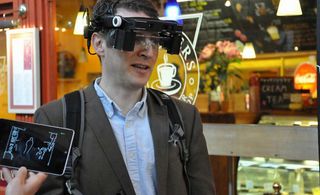Smart Glass could help visually impaired see better
British-made invention could enhance residual vision of people with visual impairment

Researchers have invented smart glasses that could improve the eyesight of visually impaired people, which have now been tested in public for the first time.
The British-made invention could help people with limited vision navigate and avoid walking into obstacles.
Invented by researchers at the University of Oxford, the smart glasses comprise of two video cameras mounted in a headset, a pocket-sized computer processor, and software that provides images of close-by objects on a display in the see-through eye pieces.
The glasses make use of what sight there is left and give users a sense of depth to prevent them from bumping into objects or tripping over steps.
The glasses are being trialled by 30 visually impaired volunteers in Oxford and Cambridge. A few of these users are walking around in public to test the device's viability.
Dr Stephen Hicks, of the Nuffield Department of Clinical Neurosciences at Oxford University, who led development of the glasses, said: "The idea of the smart glasses is to give people with poor vision an aid that boosts their awareness of what's around them - allowing greater freedom, independence and confidence to get about, and a much improved quality of life."
"We eventually want to have a product that will look like a regular pair of glasses and cost no more than a few hundred pounds - about the same as a smart phone."
Get the ITPro. daily newsletter
Receive our latest news, industry updates, featured resources and more. Sign up today to receive our FREE report on AI cyber crime & security - newly updated for 2024.
One volunteer, Iain Cairns, 43, a copywriter for a marketing agency in London, was diagnosed with the inherited eye condition choroideremia at the age of 12. Cairns put the glasses on outside a caf in Oxford's Covered Market.
"It's.. like the Lord of the Rings when he puts the ring on. And sees things in a new way.. That tablecloth is looking lovely. It's getting the pattern of the tablecloth. It's like I've wandered into an 80s pop video."
He said the glasses could help with a lot of daily challenges he faces as a blind person.
"What is great about these glasses is that you can see through them and make the most of the vision you've got. They add to what you see with extra information," he said.
It is thought that around 100,000 people in the UK alone with this low level of vision could potentially benefit.
The research and development of the glasses is funded by the National Institute for Health Research (NIHR). The trials are being carried out with the support of the Royal National Institute of Blind People (RNIB).
Rene Millman is a freelance writer and broadcaster who covers cybersecurity, AI, IoT, and the cloud. He also works as a contributing analyst at GigaOm and has previously worked as an analyst for Gartner covering the infrastructure market. He has made numerous television appearances to give his views and expertise on technology trends and companies that affect and shape our lives. You can follow Rene Millman on Twitter.





